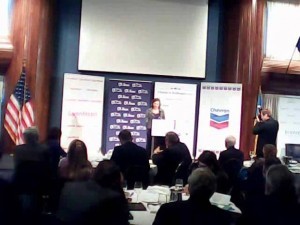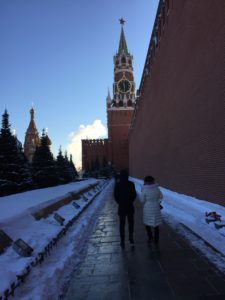WPost Pushes More Dubious Russia-bashing
The Washington Post has published another front-page story about Russia maybe placing some ads on Facebook, but the article violates a host of journalistic principles in hyping its case, reports Robert Parry.
By Robert Parry
Some people are calling the anti-Russian hysteria being whipped up across the U.S. mainstream news media a new “golden age of American journalism,” although it looks to me more like a new age of yellow journalism, prepping the people for more military spending, more “information warfare” and more actual war.
Yes, without doubt, President Trump is a boorish and dangerous demagogue, now highlighted by his reckless speech before the United Nations last week, his schoolyard Tweet taunts toward North Korean leader Kim Jong Un, and his ugly denunciation of black athletes for protesting against police killings of often unarmed African-Americans.
And, yes, I know that some people feel that the evidence-lite and/or false allegations about “Russian meddling” are the golden ticket to Trump’s impeachment. But the unprofessional behavior of The New York Times, The Washington Post and pretty much the entire mainstream media regarding Russia-gate cannot be properly justified by the goal of removing Trump from office.
Ethically in journalism, the ends – however much you might wish them to succeed – cannot justify the means, if those means involve violating rules of evidence and principles of fairness. Journalism should be a place where all sides get a fair shake, not where some get a bum’s rush.
But the U.S. mainstream media has clearly joined the anti-Trump Resistance and hates Russian President Vladimir Putin, too. So, we are given such travesties of journalism as appeared as a banner headline across the front page of Monday’s Washington Post, another screed about how Russia supposedly used Facebook ads to flip last November’s election for Trump.
The article purports to give the inside story of how Facebook belatedly came to grips with how the “company’s social network played a key role in the U.S. election,” but actually it is a story about how powerful politicians bullied Facebook into coming up with something – anything – to support the narrative of “Russian meddling,” including direct interventions by President Obama and Sen. Mark Warner of Virginia, the ranking Democrat on the Senate Intelligence Committee and a key legislator regarding regulation of high-tech industries.
Finding the ‘Evidence’
In other words, Facebook was sent back again and again to find what Obama and Warner wanted the social media company to find. Eventually, Facebook turned up $100,000 in ads from 2015 into 2017 that supposedly were traced somehow to Russia. These ads apparently addressed political issues in America although Facebook has said most did not pertain directly to the presidential election and some ads were purchased after the election.

President Barack Obama walks through the Rose Garden to the Oval Office following an all-appointees summer event on the South Lawn, June 13, 2016. (Official White House Photo by Pete Souza)
Left out of the Post’s latest opus is what a very small pebble these ads were – even assuming that Russians did toss the $100,000 or so in ad buys into the very large lake of billions of dollars in U.S. political spending for the 2016 election cycle. It also amounts to a miniscule fraction of Facebook’s $27 billion in annual revenue.
So the assertion that this alleged “meddling” – and we’ve yet to see any evidence connecting these ads to the Russian government – “played a key role in the U.S. election” is both silly and outrageous, especially given the risks involved in stoking animosities between nuclear-armed Russia and nuclear-armed America.
Even the Post’s alarmist article briefly acknowledges that it is still unclear who bought the ads, referring to the purchasers as “suspected Russian operatives.” In other words, we don’t even know that the $100,000 in ads over three years came from Russians seeking to influence the U.S. election. (By comparison, many Facebook advertisers – even some small businesses – spend $100,000 per day on their ads, not $100,000 over three years.)
But this diminutive effort by “suspected Russian operatives” doesn’t stop the Post from going on and on about “fake news” and “disinformation,” albeit again without offering evidence or specifics of any Russian “fake news” or “disinformation.”
It has simply become Official Washington’s new groupthink to say that everything linked to Russia or its international TV network RT is “fake news” or “disinformation” even though examples are lacking or often turn out to be false accusations themselves.
For instance, there is nothing in the Post’s article acknowledging that nothing from the various Democratic email disclosures, which have been blamed on Russia (again without real evidence), has been identified as untrue. So, how can truthful information, whether you like how it was obtained or not, be “fake news” or “disinformation”?
Falsehood as Fact
But Monday’s Post exposé simply asserts the claim as flat fact. Or as the article asserts: “what Russian operatives posted on Facebook was, for the most part, indistinguishable from legitimate political speech. The difference was the accounts that were set up to spread the misinformation and hate were illegitimate.”
In responsible journalism, such an accusation would be followed by a for-instance, giving an example of “the misinformation and hate” that the “Russian operatives” – note how they have been magically transformed from “suspected Russian operatives” to simply “Russian operatives” – were disseminating.
But there is no example of the Russian “misinformation and hate,” a classic violation of the reporting principle of “show, don’t tell.” In this story, it’s all tell and no show.
Indeed, what is shown in the article is often contradictory to the story’s conclusion. The article says, for instance, “A review by the company found that most of the groups behind the problematic pages had clear financial motives, which suggested that they weren’t working for a foreign government. But amid the mass of data the company was analyzing, the security team did not find clear evidence of Russian disinformation or ad purchases by Russian-linked accounts.”
So, Facebook initially – after extensive searching – did not find evidence of a Russian operation. Then, after continued pressure from high-level Democrats, Facebook continued to scour its system and again found nothing, or as the Post article acknowledged, Facebook “had searched extensively for evidence of foreign purchases of political advertising but had come up short.”
That prompted Warner to fly out to Silicon Valley to personally press Facebook executives to come up with the evidence to support the Democrats’ theory about Russia paying for carefully targeted anti-Clinton ads in key districts.
The Post’s article reported that “Finally, [Facebook Chief Security Officer Alex] Stamos appealed to Warner for help: If U.S. intelligence agencies had any information about the Russian operation or the troll farms it used to disseminate misinformation, they should share it with Facebook. The company is still waiting, people involved in the matter said.”
Under Pressure
Still, faced with extraordinary pressure from senior Democrats, Facebook finally delivered the desired results, or as the Post reported, “By early August, Facebook had identified more than 3,000 ads addressing social and political issues that ran in the United States between 2015 and 2017 and that appear to have come from accounts associated with the [St. Petersburg, Russia-based] Internet Research Agency.”
So, the ads covering three years, including post-election 2017, only “appear” to be “associated” with some private Russian operation that only allegedly has ties to the Kremlin. And the total sums of the ad buys are infinitesimal compared to what it actually takes to have any real impact on Facebook or in a U.S. presidential election.
If the context of this story were changed slightly – say, it was about the U.S. government trying to influence public opinion in another country (which actually does happen quite a bit) – the Post would be among the first news outlets to laugh off such allegations or dismiss the vague accusations as a conspiracy theory, but since these allegations fit with the prejudices of the Post’s editors, an entirely different set of journalistic standards is applied.
What the article also ignores is the extraordinary degree of coercion that such high-level political pressure can put on a company that recognizes its vulnerability to government regulation.
As Facebook has acknowledged in corporate filings, “Action by governments to restrict access to Facebook in their countries could substantially harm our business and financial results. It is possible that governments of one or more countries may seek to censor content available on Facebook in their country, restrict access to Facebook from their country entirely, or impose other restrictions that may affect the accessibility of Facebook in their country for an extended period of time or indefinitely. …
“In the event that access to Facebook is restricted, in whole or in part, in one or more countries or our competitors are able to successfully penetrate geographic markets that we cannot access, our ability to retain or increase our user base and user engagement may be adversely affected, we may not be able to maintain or grow our revenue as anticipated, and our financial results could be adversely affected.”
Avoiding Reality
In other words, another way to have framed this story is that powerful politicians who could severely harm Facebook’s business model were getting in the face of Facebook executives and essentially demanding that they come up with something to support the Democratic Party’s theory of “Russian meddling.”
The Democratic leaders wanted this finding as an explanation for Hillary Clinton’s stunning defeat, rather than going through the painful process of examining why the party has steadily lost ground in white working-class areas across the country.
What is missed in these Russia-bashing articles is that the Democratic brand has been sinking for years, including massive losses in statehouses across the country as well as in Congress. The party’s decline was not a one-off event with Donald Trump suddenly snaking away with significant parts of the white working class because the Russians bought some Facebook ads.
However, instead of looking in the mirror, national Democrats demanded that Facebook executives ferret out whatever tiny or imaginary information there might be about some Russians buying Facebook ads – and then allow those coerced findings to be fed into the excuse industry for why Hillary Clinton lost.
And, what about the Post’s repeated accusations about Russia engaging in “disinformation” and “fake news” without offering a single example? Apparently, these assertions have become such articles of faith in the U.S. mainstream media that they don’t require any proof.
However, honest journalism demands examples and evidence, not just vague accusations. The reality is that the U.S. government has stumbled again and again when seeking to paint RT as a disinformation outlet or a vehicle for undermining American democracy.
For instance, the Jan. 6 report on alleged Russian “cyber operations,” released by Obama’s Director of National Intelligence James Clapper, included a lengthy appendix, dated from 2012, which decried RT for such offenses as allowing a debate among third-party presidential candidates who had been excluded from the Republican-Democratic debates; covering the Occupy Wall Street protests; and citing the environmental dangers from “fracking.”
The idea that American democracy is threatened by allowing third-party candidates or other American dissidents to have a voice is at best an upside-down understanding of democracy and, more likely, an exercise in hypocritical propaganda.
False Accusations
Another misfired attempt to discredit RT came from Obama’s Under Secretary of State for Public Diplomacy Richard Stengel, who issued a “Dipnote” in April 2014, which helped establish the narrative of RT as a source of Russian disinformation.

A screen shot of U.S. Assistant Secretary of State for European Affairs Victoria Nuland speaking to U.S. and Ukrainian business leaders on Dec. 13, 2013, at an event sponsored by Chevron, with its logo to Nuland’s left.
For instance, Stengel claimed that RT reported a “ludicrous assertion” that the United States had spent $5 billion to produce Ukraine’s “regime change” in February 2014.
But what Stengel, a former managing editor of Time magazine, apparently failed to understand was that RT was referring to a public speech by Assistant Secretary of State for European Affairs Victoria Nuland to U.S. and Ukrainian business leaders on Dec. 13, 2013, in which she told them that “we have invested more than $5 billion” in what was needed for Ukraine to achieve its “European aspirations.” In other words, the RT report wasn’t “ludicrous” at all.
Nuland also was a leading proponent of “regime change” in Ukraine who personally cheered on the Maidan demonstrators, even passing out cookies. In an intercepted pre-coup phone call with U.S. Ambassador to Ukraine Geoffrey Pyatt, Nuland discussed who should run the new government and pondered with Pyatt how to “glue” or “midwife this thing.”
So, Stengel was the one disseminating false information, not RT.
Similarly, senior U.S. politicians, including Hillary Clinton, and the U.S. mainstream media have falsely asserted that all 17 U.S. intelligence agencies signed off on the Russia-did-it hacking claims.
For months, that canard was used to silence skepticism. After all, how could you question something that all 17 U.S. intelligence agencies confirmed to be true?
But it turned out that – as DNI Clapper, himself a hardline Russia-basher, belatedly acknowledged – the Jan. 6 report on the alleged Russian hacking was the work of “hand-picked” analysts from only three agencies, the CIA, FBI and NSA, and the “assessment” itself admitted that it was not asserting the Russian conclusion as fact, only the analysts’ opinion.
The New York Times finally retracted its use of the fake claim about “all 17 U.S. intelligence agencies” in late June 2017 although it wouldn’t let the lie lie, so instead the Times made misleading references to a “consensus” among U.S. intelligence agencies without using the number.
Recent studies by former U.S. intelligence experts have punched more holes in the certainty by raising doubts that the email downloads could have been accomplished over the Internet at the recorded speeds and more likely were achieved by an insider downloading onto a thumb drive.
Deciding What’s Real
So who is guilty of “fake news” and “disinformation”?

President Lyndon Johnson announces “retaliatory” strike against North Vietnam in response to the supposed attacks on U.S. warships in the Gulf of Tonkin on Aug. 4, 1964. (Photo credit: LBJ Library)
One positive from the current PBS series,
“The Vietnam War,” is that despite its bend-over-backwards attempts to make excuses for the “good faith” decisions by U.S. politicians, no one can watch the series without encountering the chasm between the upbeat Official Story being peddled by the U.S. government and the ghastly on-the-ground reality.
Yet, given how little accountability was meted out then for journalists who served as conveyor belts for pro-war propaganda in Vietnam – or more recently over the fraudulent reporting that rationalized the U.S. aggressive war against Iraq – it is perhaps not surprising that similar false group thinks would coalesce around Russia now.
Careerist journalists understand that there is no danger in running with the pack – indeed, there is safety in numbers – but there are extraordinary risks to your career if you challenge the conventional wisdom even if you turn out to be right. As one establishment journalist once told me, “there’s no honor in being right too soon.”
So, for the Post reporters responsible for the latest journalistic violation of standards – Adam Entous, Elizabeth Dwoskin and Craig Timberg – there will be no penalty for the offense of telling about Russia’s alleged “disinformation” and “fake news” – rather than showing, i.e., providing actual examples. When it comes to Russia these days – as with the Vietcong in the 1960s or Iraq in 2002-03 – you can pretty much write whatever you want. All journalistic standards are gone.
Yet, what is perhaps most insidious about what we are seeing is that – in the name of defending democracy – the U.S. mainstream media is trampling a chief principle of the Enlightenment, the belief that the marketplace of ideas is the best way to determine the truth and to create an informed populace.
The new U.S. mainstream media paradigm is that only establishment-approved views can be expressed; everything else must be suppressed, purged and punished.
For instance, if you question the State Department’s narrative on alleged Syrian government sarin attacks – by noting contrary evidence that points to staged incidents by Al Qaeda’s Syrian affiliate – you are called an “apologist” for Syrian President Bashar al-Assad.
If you question the one-sided State Department narrative regarding the Ukraine coup in 2014 – indeed even if you use the word “coup” – you are denounced as a “Kremlin stooge.”
No ‘Other’ Side
It is now not okay to even consider the other side of these stories, just as it was anathema to suggest that Saddam Hussein’s Iraqi government may have been telling the truth in 2002-03 when it declared repeatedly that it had destroyed its WMDs. That made you a “Saddam apologist.”

At the start of the U.S. invasion of Iraq in 2003, President George W. Bush ordered the U.S. military to conduct a devastating aerial assault on Baghdad, known as “shock and awe.”
The hostility toward Americans who dare question the current anti-Russian hysteria was highlighted by an article last
Thanksgiving Day by one of the authors of the new Post article, Craig Timberg.
In another front-page Post story, Timberg allowed an anonymous group called PropOrNot to malign the professionalism and patriotism of 200 Web sites, including our own Consortiumnews, that were lumped together in a McCarthyistic smear that they were somehow guilty of disseminating “Russian propaganda.”
The unnamed accusers – granted anonymity by the Post – acknowledged that they had no evidence that the sites were part of some grand Russian conspiracy but made the judgment based on PropOrNot’s analysis of the Web sites’ content.
In other words, if you questioned the State Department’s narratives on Ukraine or Syria – regardless of how well-supported those critiques were – you got smeared as a “Russian propagandist” – and the Post, which didn’t even bother to contact the accused, considered that sort of analysis to be worthy of its front page.
The story fed into another frenzy about the need to use algorithms and artificial intelligence to hunt down and suppress or purge such dissenting views from the Internet, supposedly to protect the sanctity of American democracy and spare Americans from exposure to “fake news.”
So, well-meaning Americans who may hope that Russia-gate will somehow bring down Trump are getting recruited into a movement that intends to silence dissent and allow the U.S. establishment to dictate what information you will get to see and hear.
And that officially approved “information” will surely lead to new global tensions, more military spending. and additional warfare up to and possibly including nuclear war with Russia.
Investigative reporter Robert Parry broke many of the Iran-Contra stories for The Associated Press and Newsweek in the 1980s. You can buy his latest book, America’s Stolen Narrative, either in print here or as an e-book (from Amazon and barnesandnoble.com).
https://consortiumnews.com/2017/09/25/wpost-pushes-more-dubious-russia-bashing/





0 Comments:
Post a Comment
Subscribe to Post Comments [Atom]
<< Home